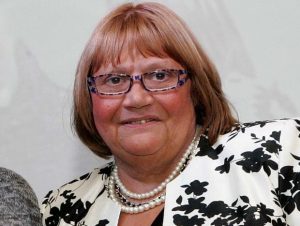County Durham Labour has outlined the extra-ordinary emergency measures implemented to protect people’s health.
As the latest lockdown rules come into force across the region, the County Council Labour administration is stepping up emergency response plans to support communities, businesses and vulnerable people.
Over the past six months, councillors worked shoulder to shoulder with officers to reprioritise investment, organise help for the vulnerable and draw down Government support to distribute quickly to those in most need.
Cllr Lucy Hovvels, portfolio holder for Adult and Health Services at Durham County Council, said:
Cllr Lucy Hovvels MBE
“Looking back, the proactive approach of Labour members and council officers helped keep us on the front foot throughout the initial wave of COVID19. We faced up to an unprecedented threat with an unprecedented response.
“Translating World Health Organisation and inconsistent government guidance was challenging, but we turned it into local action and support, and we established a support hub with the community and voluntary sector, to help vulnerable people affected by coronavirus including those advised to ‘shield’ themselves.
“Within weeks, we’d offered assistance to 75,000 vulnerable people in the county, as well as to 13,271 people who needed help to shield from infection because of extreme risk of illness – it was a mammoth task and everyone involved must be thanked. However, the spectre of COVID19 has again hit our region. The human cost has been incalculable, but thanks to community spirit, perseverance and an incredible team of frontline workers, we know we can get through whatever is thrown at us.”
Labour members helped establish a volunteer bureau to enable local people and groups who want to help, as well as approving an additional £1.5million investment via County Durham’s Area Action Partnerships (AAPs) to support community responses
Vulnerable people were also helped with an increase to the Welfare Assistance Scheme of a further £1million for emergency financial assistance for those in crisis.
Cllr Angela Surtees, Labour’s portfolio holder for Social Inclusion, said:
“As well as the health impact, we are also very conscious of the financial effect on people – we back extending the furlough scheme and will continue to lobby the Government for assistance via the business support grants scheme, which we distribute. We have extended the benefits of the Local Council Tax Support Scheme, utilised the Hardship Fund up to £300 council tax relief and worked with hundreds of taxpayers in financial hardship for payments to be deferred.
“Labour is the party of the people and it is the people we think of first when the threat of COVID19 increases once again. We will continue to support social care providers through telephone calls, have agreed 10% funding increases for social care providers in addition to their annual uplift to meet additional costs of dealing with the pandemic and made £13million of payments upfront to help with funding and cashflow issues.
“The numbers involved are staggering, but we know that when the chips are down and we need to mobilise to help protect and support our communities, we can do it.”
County Durham’s Labour-run Council also:
- Supplied over 815,000 items of PPE before the end of May, including over 480,000 items to the social care sector
- Established an infection inspection team and comprehensive multi-agency support package for care homes to prevent and tackle infection outbreaks
- Supported over 8,000 businesses with total grant payments of over £94million
- Recalculated business rates bills of just under 2,300 businesses, applying business rate reductions and discounts totalling over £49 million
- Introduced immediate supplier payments, supplier relief for important vulnerable suppliers and rent deferrals for our commercial tenants
- Provided advice and assistance to schools across the county, helping over 240 schools remain open to provide childcare for key workers
- Maintained all child protection, safeguarding and social care services, maintaining contact with children and families
- Maintained essential services such as refuse collection and social care
- Rapidly expanded on-line service delivery, communications and online and telephone customer support
- Developed access to rapid local testing for council and social care staff and continuing to support the roll-out of testing via the National Testing Programme

